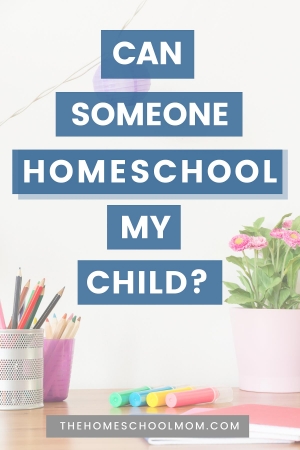You work. Or you cannot imagine yourself as a homeschool parent. Or your kids are demanding, and you don't mesh with them well. Or you have a child who has special needs you don't feel prepared to help with. Or you have a health problem that will make homeschooling challenging to impossible.
Or really, you just don't want to homeschool.
But your kids need to be out of school, and they need to be homeschooled. I hear your question: "Can somebody homeschool my kids?"
Maybe.

Step 1: Find out what's legal.
Homeschool laws differ from country to country and from state to state in the U.S. The first step is to determine what your state law allows. In some cases, the law specifically limits homeschooling to parents providing education for their own children.
There are some states that also allow certified tutors to homeschool other people's children, meaning people with a license to teach may be employed to do the homeschooling. In some states, the law does not address how children may be homeschooled, so a variety of ways exist for children to learn outside of school attendance.
In other states, parents may have to be clear that they retain the official responsibility for homeschooling their children, but they can use a variety of tutors, programs, classes, and co-ops, as long as they don't officially designate all the homeschooling responsibility to someone else.
Look for information from your state homeschool organization(s) and talk to local homeschoolers to understand the law and how it is interpreted in your state.
Step 2: Consider your options.
Depending on what's legal where you live, there are many ways you can outsource homeschooling:
- Hire a licensed teacher. The upside is that the state and your family may see this as getting "the real thing" as far as an education. The downside is that it can be expensive to pay a qualified person to provide both childcare and academic education.Some people with teaching experience also stress doing things "the school way" rather than with the flexibility of homeschooling. If you want to homeschool in order to differentiate from school, some licensed teachers (sometimes called certified tutors) may not do that, while others would jump at the chance.
- Send your kids to a cottage school. A cottage school is when a parent takes in a handful of kids to learn together in her home - her "cottage." There are states where there are informal cottage schools, with homeschool moms commonly taking in two to four extra children close to her own children's ages, so they can learn together, and the mom can earn some extra money.Cottage schools may not be mentioned in the law at all, and thus allowed unless your state has a strict provision that homeschooled kids must be homeschooled only by their parents. Using a cottage school is not as costly as hiring a licensed teacher, and homeschool moms typically have a more flexible approach to education. Not as many services are provided as in a private or public school, but it's often a situation that works well. It's similar to a family daycare, but with academics added.Many states and communities do not have cottage schools. (Sometimes "cottage" can be part of the name of a school or a homeschool friendly resource center, and it's not a family-type cottage school).
- Combine childcare and part-time educational services. You can pay childcare providers, and ask them to take your child to classes, co-ops, programs, tutoring, and activities. They're not directly responsible for the "delivery" of academics, but they provide transportation and access.They might even take on a "helping with homework" or "helping with lessons" role, but overseeing the umbrella of academics falls to the parent.
- Combine childcare and university model homeschool classes. University model classes are offered in many communities at churches or community centers that have programs for homeschoolers. Classes are commonly offered two days per week with homework in between, similar to a university schedule.University model homeschool classes are not quite a private school, but typically have more institutional trappings than a cottage school. They might have social groups, a yearbook, and activities. Some university model classes can be expensive. Your childcare provider may have to help with homework and transportation on the days that classes are offered, which may not follow a typical school schedule.
- Combine childcare and online (or "virtual") school. If you have a motivated childcare provider and/or a motivated child, your child might be able to learn through online classes. Online classes vary in approach, delivery, and quality. Some children learn to "jump the hoops" of passing a class without much retention or development of skill or knowledge, while others may absorb the information.Some online instruction provides personalized feedback to the students, resulting in individual attention and greater growth. Online instruction that is provided "free" by a public school may actually be public school at home, which means your child is still subject to public school rules.
- Pay a homeschool mom. There may be a homeschool mom who isn't interested in running a cottage school, but who would not mind adding just your child into the mix with her homeschooled kids. She benefits from the pay, and your child benefits from her experience homeschooling.The downside may be that her approach may be different from your ideas about homeschooling, and since it's working for her own kids, she's not likely to change her ways. She also may already have her hands full with her own kids' activities and enrichment.Taking on an extra child represents a big commitment, and this practice is not as common as you might think. Additionally, it takes a lot of networking in the homeschooling community to find someone who is willing and who you want your child with day in and day out. And again, it might not be legal in your state.
- Find Mary Poppins. The right nanny, licensed to teach or not, could be great at homeschooling your kids. This "governess model" is fairly rare and expensive, but might be right for some families.
While you may not be looking for someone else to homeschool your child because you are working, you will probably benefit from learning more about how parents employed outside the home work out homeschooling their kids. Read the tips from those who are working and homeschooling.
Step 3: Do some deschooling and Homeschooling 101.
Homeschooling is not school. Take some time to learn about deschooling and give your child a chance to make a transition from school to homeschooling. Take a look at all the Homeschooling 101 stuff. You'll be responsible for it, even if you delegate the day-to-day to someone else.
Step 4: Prepare for pushback.
Homeschooling is traditionally seen as an in-the-family thing, with social time, some classes, and enrichment added from the larger community. That's true both inside and outside the homeschooling community. That's the norm.
This is changing a bit as homeschooling is growing. One reason is that homeschooling is becoming a large enough market to be noticed by educational service providers. Another reason is that when critical mass is reached in specific communities, parents themselves can create co-ops and university model schools and have enough students and parent volunteers and instructors. Another reason is that charter schools and online schools in some states have changed the public perception of homeschooling.
That said, there may be traditional homeschooling families who will not welcome someone who wants someone else to homeschool the kids. The slight may not even be intentional, but the primary social group in homeschooling is a parent together with her kids, and if you overreach, you'll risk alienating yourself with the perception that you want others to be responsible for your children. While homeschoolers frequently cooperate, help one another, and trade services, the ethos is very much that families take responsibility for their children.
If your child is challenging, and that's one reason you are taking her out of school but don't want to homeschool yourself, you may find resentment if you're not present yourself to support your child in learning positive behavior. New homeschooling parents whose kids get "dropped off" everywhere without parental support may run amok in their local homeschooling community. It's a high touch dynamic.
That said, if it's legal where you live, and if you're thoughtful of others and remember that this is not taxpayer supported education that your child has a "right" to, you may be able to put together a positive scenario where somebody else homeschools your child.
Step 5: Get set and go!
After working out the pieces of your puzzle, think through the details, and give it a try. You might also continue to consider whether it's possible for you to homeschool your kids yourself. Unintended and even unwelcome homeschooling has sometimes yielded unexpected benefits to families, as parents and children work through challenging situations together. Sometimes you think you can't homeschool because of work, but further exploration may show how others have done just that.
But sometimes? Getting a child out of a negative situation is just a net positive, even if you don't deliver the educational component of homeschooling yourself.




 A popular speaker at homeschooling conferences, business groups, and parents’ groups, Jeanne Potts Faulconer homeschooled her three sons in North Carolina, Mississippi, and Virginia for twenty years. Holding her Master of Arts degree in Communication, Jeanne conducted portfolio evaluations for Virginia homeschoolers for evidence of progress for many years. Jeanne is a former college faculty member, former editor for several publications, news correspondent for WCVE, and former director of Brave Learner Home. She is the contributing editor for TheHomeSchoolMom newsletter and writes the popular Ask Jeanne column addressing homeschool parents' questions here at TheHomeSchoolMom.
A popular speaker at homeschooling conferences, business groups, and parents’ groups, Jeanne Potts Faulconer homeschooled her three sons in North Carolina, Mississippi, and Virginia for twenty years. Holding her Master of Arts degree in Communication, Jeanne conducted portfolio evaluations for Virginia homeschoolers for evidence of progress for many years. Jeanne is a former college faculty member, former editor for several publications, news correspondent for WCVE, and former director of Brave Learner Home. She is the contributing editor for TheHomeSchoolMom newsletter and writes the popular Ask Jeanne column addressing homeschool parents' questions here at TheHomeSchoolMom.

Leave a Reply